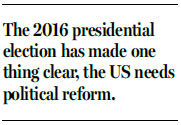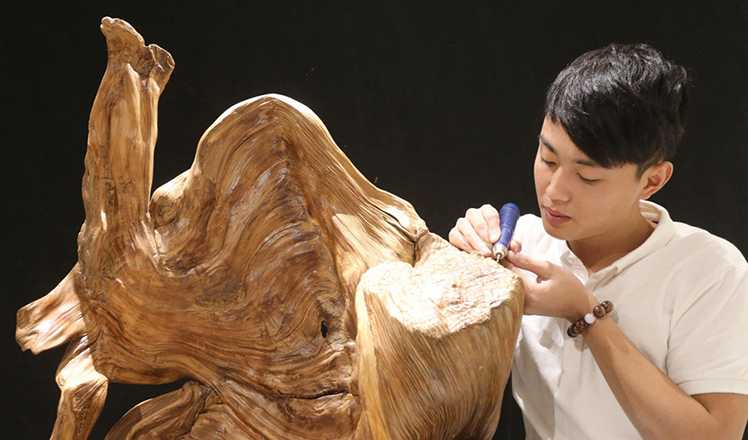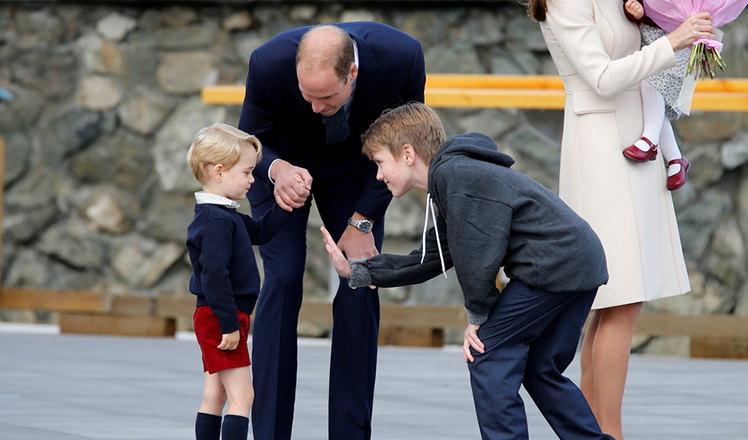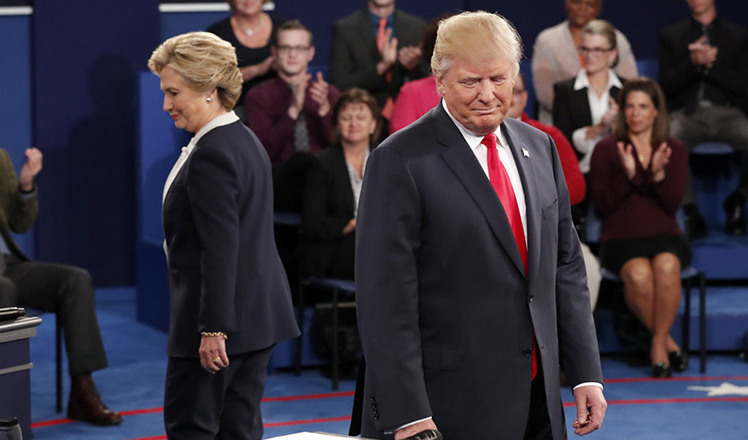Election game mirrors failure of US democracy
Updated: 2016-10-11 07:53
By Zhang Zhixin(China Daily USA)
|
||||||||
The chaotic 2016 presidential election has highlighted the defects in the US election system and the dysfunction of democracy. The "email-gate" uncovered by the release of the Democratic National Committee emails stunned the world, and showed that the so-called fair selection of candidates was anything but. Meanwhile, whether the outspoken and reckless real-estate mogul Donald Trump wins the race or not, he has irreversibly damaged US democracy already.
The email scandal revealed the black box of how party elites manipulate the presidential election, as it showed the party establishment and the Democratic National Committee violated the neutrality principle by working with the Hillary Clinton campaign team to help her clinch the Democratic nomination. For this purpose, they attempted to attack her rival Bernie Sanders' ethnic identity as a Jew. And they went so far as to plan cyberattacks on the supporters of Sanders. When the scandal was uncovered, the supporters of Sanders were furious but the candidate himself was calm, as if unsurprised by the shenanigans against him.
Meanwhile, the Democratic camp has made great efforts to defame Trump by highlighting his discriminatory words against women, the disabled and minority groups, his past bankruptcies, and his edgy temperament that the Democrats say make him unfit to be the president. Interestingly this is the very image he wants to present to voters.
Second, the de facto two-party system and the winner-takes-all delegates counting system make extreme candidates stand out in the primaries. Therefore, moderate and rational candidates are at a disadvantage. In the primary elections, the two parties' national conventions are actually meant to function as gatekeepers. Together with the electoral college, the party's national conventions were designed to prevent a demagogue from hijacking public support and winning the race. In fact, the Republican National Committee could easily have adjusted the rules and prevented the controversial Trump from being nominated. However, the RNC chose not to because the anti-establishment sentiment was so strong that the traditional candidates such as Jeb Bush and Marco Rubio were considered to have less chance of winning, and the GOP could not find any viable alternative to replace Trump in such a short time. So they had to accept the hard reality and stand behind Trump to fight against Hillary Clinton.

Third, democracy had to yield to populism when the party was hijacked by the radical politician. The nomination of Trump clearly showed that GOP was not able to control the election process. Nor could the GOP abandon the radical candidate, rather it had to flow with the populist trend. Thus, democracy has been distorted and does not accurately reflect the people's will.
In the post-Cold War era, globalization has hastened economic inequality. The financial crisis has caused the middle class to shrink and created more discontent among those in the lower classes. Politically, ever since the administration of Bill Clinton, party politics has widened the gap between the elite and the grassroots. Politicians make irresponsible promises for the sake of votes, and break their word after they are elected. This has resulted in the overwhelming anti-establishment sentiment in the election this year. Trump has made good use of this sentiment and succeeded in a hostile takeover of the Republican Party.
No matter whether Trump wins the election or not, he has irreversibly damaged US democracy with his rhetoric. At the same time, he has highlighted the inconvenient truth that discrimination against minority groups, the disparity between the rich and the poor and the influence of money in politics exist even though mainstream society tries to ignore them.
The 2016 presidential election has made one thing clear, the US needs political reform.
The author is the head of American Political Studies at the Institute of American Studies, China Institutes of Contemporary International Relations.
Courtesy: chinausfocus.com
(China Daily USA 10/11/2016 page12)

 World's top 10 most valuable unicorn companies
World's top 10 most valuable unicorn companies
 Carver finds fame, money in wood sculptures
Carver finds fame, money in wood sculptures
 Missile destroyer to become local military-themed park
Missile destroyer to become local military-themed park
 The world in photos: Sept 26 - Oct 9
The world in photos: Sept 26 - Oct 9
 Classic cars glitter at Berlin motor show
Classic cars glitter at Berlin motor show
 Autumn colors in China
Autumn colors in China
 US second presidential debate begins
US second presidential debate begins
 Egrets Seen in East China's Jiangsu
Egrets Seen in East China's Jiangsu
Most Viewed
Editor's Picks

|

|

|

|

|

|
Today's Top News
Trump outlines anti-terror plan, proposing extreme vetting for immigrants
Phelps puts spotlight on cupping
US launches airstrikes against IS targets in Libya's Sirte
Ministry slams US-Korean THAAD deployment
Two police officers shot at protest in Dallas
Abe's blame game reveals his policies failing to get results
Ending wildlife trafficking must be policy priority in Asia
Effects of supply-side reform take time to be seen
US Weekly

|

|